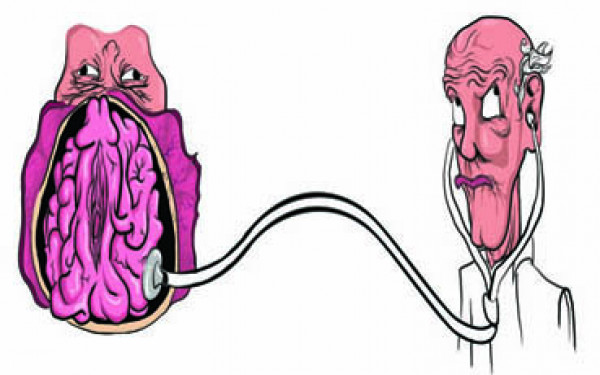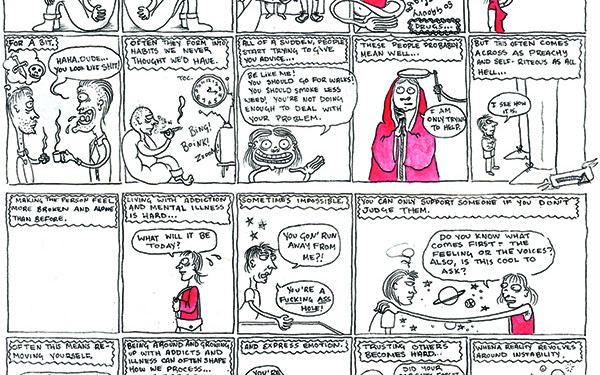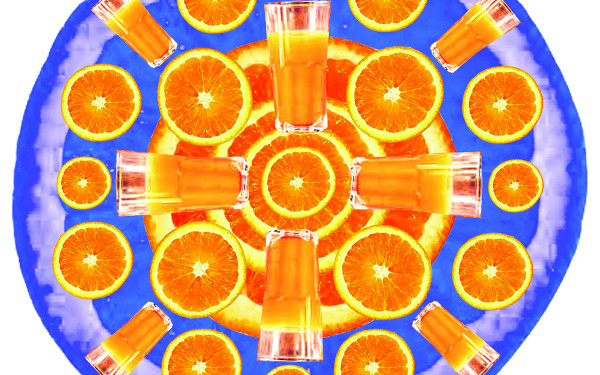Mental Squeeze
Addiction: Not All in the Family
I remember the first time I encountered alcohol without parents present.
It was a very casual setting at my friend’s vacant house after the last day of grade seven, and I remember being terrified of the murky liquid in the orange Smirnoff Ice bottle that was being passed around, hoping that it would be finished by the time it got to me.
When the half-full bottle finally made it to me, I took a sip of the toxic-sweet liquid and passed it back. No big deal, and three sips later I found myself feigning drunk, feeling a little older and a whole lot cooler.
That would be my only encounter with alcohol for the next three years, and it would be the last time I was blissfully ignorant on the subject.
My education on the topic of alcoholism and addiction began after those three years, when one night as dinner was being prepared, my sister gathered my brother, my mom, my dad and me in the kitchen and tearfully admitted her struggles with alcohol.
At 15 I knew next to nothing about addiction, other than a stereotypical ideal of what an addict would look like, with a very clear image of an old, beer-bellied and bearded homeless man slumped over outside somewhere.
In my mind, my 21-year-old sister, a model who excelled in university while taking six courses and also interning, was not who I pictured to be an alcoholic.
I knew young people drank, and I knew it was considered cool to drink, but I definitely did not think anyone could be classified as being an addict at such a young age.
This thought is not exclusively reserved for my younger self, as education on addiction is hugely lacking. It is rarely discussed in school, other than maybe a brief mention in health class, in which the teachers opt to scare students from trying alcohol or drugs, rather than actually educating them on being responsible.
Something that is not taught in school is how to know when the young, innocent-seeming phase of experimentation and drinking to excess no longer qualify as just a phase, but a full-blown, life altering addiction, or how we can avoid it if possible.
For most people, binge drinking and partying is just a phase. There is no way of knowing which kids will have the predisposition for addiction that is often set off by drinking or using drugs.
“Substance abuse and addiction can look the same to the outsider, but there is an invisible line that separates the two,” says Amy Allison, my sister, now six years sober and an addictions counsellor in Calgary.
“Once a person crosses over into addiction, they are unable to ever return to using substances in a safe way, as the ‘pleasure centre’ of their brain has been permanently altered.”
She also says that abuse becomes addiction when the person is unable to stop their use despite consequences, such as negative impacts on important relationships, health problems or other important aspects of one’s life.
The topic of youth experimenting with drinking and drugs is strangely held as an abnormal norm, something that parents deem both taboo, but also as a rite of passage and many turn a blind eye to. It is something that is greatly romanticized and glamorized in youth culture, partly due to its frowned-upon nature, but it also lacks the edification that young people desperately need.
Alcoholism is in part due to genetics, but this doesn’t mean that people who are not genetically predisposed to addiction are exempt from one day battling the disease.
William Jubb is a great example of someone who has battled addiction from a very early age. Being over ten years sober now, he owns his own construction business. His addiction started very early, as he started smoking weed when he was just seven-years-old.
This developed through the years, ultimately resulting in a life threatening crack addiction, which he dealt with by going to rehab.
I knew young people drank, and I knew it was considered cool to drink, but I definitely did not think anyone could be classified as being an addict at such a young age.
“Of course it wasn’t my choice to go, but I was so deep into my addiction that I wouldn’t have been able to make that decision at the time,” Jubb says.
“Now I attend weekly meetings, even after ten years of sobriety. I think I still would have become an addict if they taught us better about addiction when I was in school, but I may have gotten help earlier if they had.”
I am pretty confident that had it not been for my sister and her addiction impacting and educating me, I myself would suffer from addiction.
There was no other source that warned me of the dangers of alcohol abuse found in today’s youth culture—how else would I get such knowledge on the serious ongoing theme of addiction that many people think will never happen to them?
However, this higher education that I acquired does not mean that I practice abstinence from the bottle, rather it makes me drink smarter, know my limits and that drinking has consequences greater than the inevitable hangover—something that much of youth sum up to fairy tales or things that can never happen to them.
Phylicia Tran, a 22-year-old recent graduate from the University of Calgary believes that we are currently living in an alcohol-driven youth culture, but that it is completely normal.
“I do think excessive drinking and partying is a phase, but the rate and age at which people grow out of it varies. I have friends that are 22 who are already over partying, and I have 40-year-old friends who still party more than I do. It’s all relative,” Tran says.
“However, I think it is no longer a phase and is actually addiction when you can’t imagine your life without alcohol or drugs.”
Funnily enough, this education that my whole family inevitably received was not enough to inhibit addiction rearing its ugly head once more; it has not yet been two years that my brother Chris, the person whom we thought we didn’t have to worry about, became the topic of discussion, and an intervention had been arranged.
His decline into addiction had happened at such a slow pace that it caught us all off guard.
Two weeks later, we sat in a circle and intervened, resulting in his half-year stay at the British Columbia rehab centre, Edgewood.
Now sober, Chris sums it up to a perfect storm of a bad breakup, high anxiety and a genetic predisposition that threw him over the edge.
Having chosen to not participate in drinking or drug use in high school, it was when Chris went to university that he started experimenting.
“It started off as an adventure, something unknown, something I wasn’t supposed to do, that was very exciting. I had the idea in my head that university was the time to do all this partying. I found that my priorities had changed slowly over time, so slowly that I didn’t notice it,” says Chris.
He goes on to say that the basis of addiction rocked him to his core.
“I was no longer confident in my future. There was a lot of fear, guilt and shame over failing at post-secondary,” he says. “It was no longer a choice. It was no longer a party.”



__600_375_90_s_c1.jpg)


